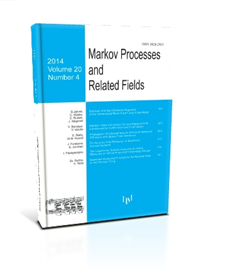Markov Property of Determinantal Processes with Extended Sine, Airy, and Bessel Kernels
M. Katori, H. Tanemura
2011, v.17, Issue 4, 541-580
ABSTRACT
When the number of particles is finite, the noncolliding Brownian motion (the Dyson model) and the noncolliding squared Bessel process are determinantal diffusion processes for any deterministic initial configuration $\xi=\sum_{j \in \Lambda} \delta_{x_j}$, in the sense that any multitime correlation function is given by a determinant associated with the correlation kernel, which is specified by an entire function $\Phi$ having zeros in $\supp \xi$. Using such entire functions $\Phi$, we define new topologies called the $\Phi$-moderate topologies. Then we construct three infinite-dimensional determinantal processes, as the limits of sequences of determinantal diffusion processes with finite numbers of particles in the sense of finite dimensional distributions in the $\Phi$-moderate topologies, so that the probability distributions are continuous with respect to initial configurations $\xi$ with $\xi(\r)=\infty$. We show that our three infinite particle systems are versions of the determinantal processes with the extended sine, Bessel, and Airy kernels, respectively, which are reversible with respect to the determinantal point processes obtained in the bulk scaling limit and the soft-edge scaling limit of the eigenvalue distributions of the Gaussian unitary ensemble, and the hard-edge scaling limit of that of the chiral Gaussian unitary ensemble studied in the random matrix theory. Then Markovianity is proved for the three infinite-dimensional determinantal processes.
Keywords: determinantal processes,correlation kernels,random matrixtheory,infinite particle systems,Markov property,entire function and topology
COMMENTS
Please log in or register to leave a comment

